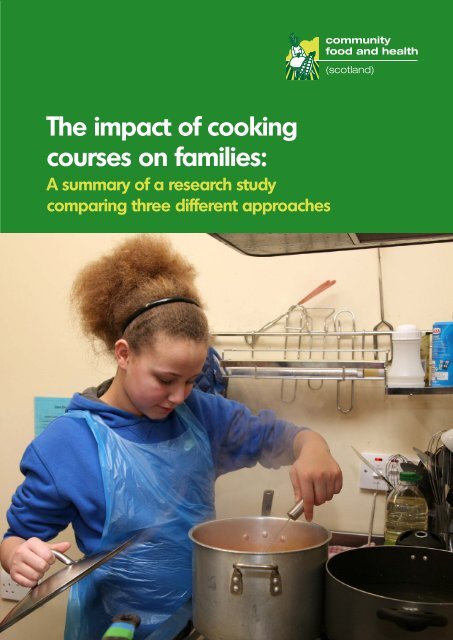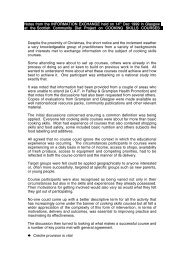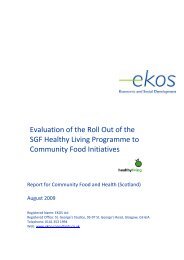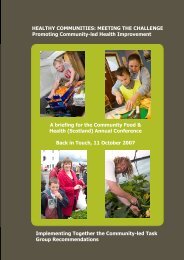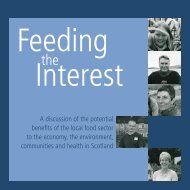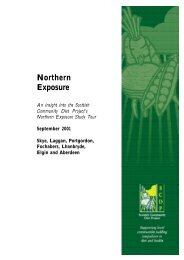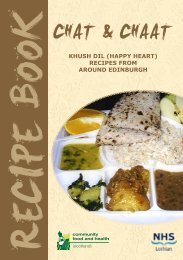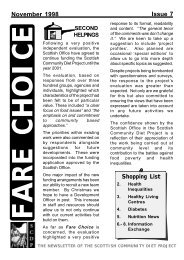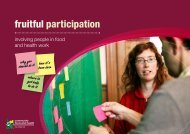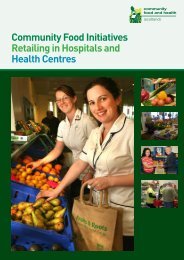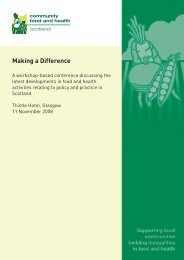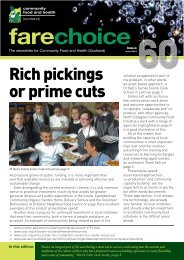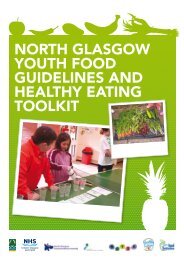The impact of cooking courses on families: - Community Food and ...
The impact of cooking courses on families: - Community Food and ...
The impact of cooking courses on families: - Community Food and ...
Create successful ePaper yourself
Turn your PDF publications into a flip-book with our unique Google optimized e-Paper software.
<str<strong>on</strong>g>The</str<strong>on</strong>g> <str<strong>on</strong>g>impact</str<strong>on</strong>g> <str<strong>on</strong>g>of</str<strong>on</strong>g> <str<strong>on</strong>g>cooking</str<strong>on</strong>g><br />
<str<strong>on</strong>g>courses</str<strong>on</strong>g> <strong>on</strong> <strong>families</strong>:<br />
A summary <str<strong>on</strong>g>of</str<strong>on</strong>g> a research study<br />
comparing three different approaches
About CFHS<br />
Acknowledgements<br />
What this is about<br />
<strong>Community</strong> <strong>Food</strong> <strong>and</strong> Health (Scotl<strong>and</strong>) aims<br />
to ensure that every<strong>on</strong>e in Scotl<strong>and</strong> has the<br />
opportunity, ability <strong>and</strong> c<strong>on</strong>fidence to access<br />
a healthy <strong>and</strong> acceptable diet for themselves,<br />
their <strong>families</strong> <strong>and</strong> their communities. We do<br />
this by supporting work with <strong>and</strong> within lowincome<br />
communities that addresses health<br />
inequalities <strong>and</strong> barriers to healthy <strong>and</strong><br />
affordable food.<br />
Barriers being addresses by community-based<br />
initiatives are:<br />
<strong>Community</strong> <strong>Food</strong> <strong>and</strong> Health (Scotl<strong>and</strong>)<br />
would like to thank all those that have<br />
c<strong>on</strong>tributed to this research:<br />
Fi<strong>on</strong>a Smith <strong>and</strong> Mhairi McNidder: NHS<br />
Ayrshire <strong>and</strong> Arran<br />
Lyndsey McLellan: Edinburgh<br />
<strong>Community</strong> <strong>Food</strong><br />
Mirren Vanko: Edinburgh City Council<br />
Fi<strong>on</strong>a Adams <strong>and</strong> Jane Westall: North<br />
Perth <strong>Community</strong> School<br />
C<strong>on</strong>silium Research <strong>and</strong> C<strong>on</strong>sultancy<br />
This short report provides a summary <str<strong>on</strong>g>of</str<strong>on</strong>g><br />
research commissi<strong>on</strong>ed by CFHS that studied<br />
the <str<strong>on</strong>g>impact</str<strong>on</strong>g> <str<strong>on</strong>g>of</str<strong>on</strong>g> <str<strong>on</strong>g>cooking</str<strong>on</strong>g> skills <strong>on</strong> <strong>families</strong>. Three<br />
food initiatives took part in the research <strong>and</strong><br />
each used different approaches to teaching<br />
<str<strong>on</strong>g>cooking</str<strong>on</strong>g>. This report provides an overview<br />
About the research<br />
<str<strong>on</strong>g>of</str<strong>on</strong>g> the benefits <str<strong>on</strong>g>of</str<strong>on</strong>g> the different approaches<br />
<strong>and</strong> it will be useful to any<strong>on</strong>e c<strong>on</strong>sidering<br />
developing or improving <str<strong>on</strong>g>cooking</str<strong>on</strong>g> sessi<strong>on</strong>s for<br />
parents, <strong>families</strong> or young people.<br />
Availability – increasing access to fruit <strong>and</strong><br />
vegetables <str<strong>on</strong>g>of</str<strong>on</strong>g> an acceptable quality <strong>and</strong> cost<br />
Affordability – tackling not <strong>on</strong>ly the cost <str<strong>on</strong>g>of</str<strong>on</strong>g><br />
shopping but also getting to the shops<br />
Skills – improving c<strong>on</strong>fidence <strong>and</strong> skills in<br />
<str<strong>on</strong>g>cooking</str<strong>on</strong>g> <strong>and</strong> shopping<br />
Culture – overcoming ingrained habits<br />
Through our work we aim to support<br />
communities to<br />
• Identify barriers to a healthy balanced diet<br />
• Develop local resp<strong>on</strong>ses to addressing these<br />
barriers, <strong>and</strong><br />
• Highlight where acti<strong>on</strong>s at other levels, or in<br />
other sectors are required.<br />
We value the experience, underst<strong>and</strong>ing, skills<br />
<strong>and</strong> knowledge within Scotl<strong>and</strong>’s community<br />
food initiatives <strong>and</strong> their unique c<strong>on</strong>tributi<strong>on</strong> to<br />
developing <strong>and</strong> delivering policy <strong>and</strong> practice at<br />
all levels.<br />
From 1 April 2013 CFHS will become part<br />
<str<strong>on</strong>g>of</str<strong>on</strong>g> NHS Health Scotl<strong>and</strong>, a Special Health<br />
Board with a nati<strong>on</strong>al remit to reduce health<br />
inequalities.<br />
C<strong>on</strong>tents<br />
What this is about page 3<br />
About the research page 3<br />
Why we did it page 4<br />
About the three groups<br />
<strong>and</strong> approaches page 5<br />
What were the benefits <str<strong>on</strong>g>of</str<strong>on</strong>g><br />
the different approaches page 6<br />
What barriers did participants<br />
report when attempting to maintain<br />
or develop <str<strong>on</strong>g>cooking</str<strong>on</strong>g> skills page 8<br />
Further good practice ideas for<br />
improving the delivery <strong>and</strong><br />
attendance <str<strong>on</strong>g>of</str<strong>on</strong>g> community<br />
<str<strong>on</strong>g>cooking</str<strong>on</strong>g> <str<strong>on</strong>g>courses</str<strong>on</strong>g> page 9<br />
Research methods page 10<br />
C<strong>on</strong>clusi<strong>on</strong> page 10<br />
References page 11<br />
C<strong>on</strong>tact details <str<strong>on</strong>g>of</str<strong>on</strong>g> groups page 11<br />
In 2012, <strong>Community</strong> <strong>Food</strong> <strong>and</strong> Health<br />
(Scotl<strong>and</strong>) or CFHS, appointed C<strong>on</strong>silium<br />
Research <strong>and</strong> C<strong>on</strong>sultancy Limited to<br />
undertake research about <str<strong>on</strong>g>cooking</str<strong>on</strong>g> <str<strong>on</strong>g>courses</str<strong>on</strong>g><br />
<strong>and</strong> their <str<strong>on</strong>g>impact</str<strong>on</strong>g> <strong>on</strong> <strong>families</strong>. <str<strong>on</strong>g>The</str<strong>on</strong>g> aim <str<strong>on</strong>g>of</str<strong>on</strong>g> the<br />
research was to explore the relative merits<br />
<strong>and</strong> strengths <str<strong>on</strong>g>of</str<strong>on</strong>g> three different approaches<br />
to delivering h<strong>and</strong>s-<strong>on</strong> cookery <str<strong>on</strong>g>courses</str<strong>on</strong>g> in a<br />
group setting to:<br />
• <strong>families</strong> - parents (or carers) learning<br />
together with their children;<br />
• parents (or carers) <str<strong>on</strong>g>of</str<strong>on</strong>g> nursery or schoolaged<br />
children; or<br />
• young people (aged around 13 years).<br />
<str<strong>on</strong>g>The</str<strong>on</strong>g> researchers looked for evidence that<br />
the cookery sessi<strong>on</strong>s had met the following<br />
outcomes:<br />
• Increased knowledge about food <strong>and</strong> health,<br />
eg. an underst<strong>and</strong>ing <str<strong>on</strong>g>of</str<strong>on</strong>g> healthy eating, the<br />
<strong>Food</strong> St<strong>and</strong>ards Agency’s (FSA) eatwell<br />
plate, <strong>and</strong> weaning.<br />
• Increased c<strong>on</strong>fidence around healthy eating,<br />
eg. c<strong>on</strong>fidence to try new foods, <strong>and</strong> follow<br />
or adapt recipes.<br />
• Improved <str<strong>on</strong>g>cooking</str<strong>on</strong>g> skills – such as <str<strong>on</strong>g>cooking</str<strong>on</strong>g><br />
techniques <strong>and</strong> knife skills.<br />
• Attempts to change behaviour to improve<br />
nutriti<strong>on</strong>, eg. eating fewer takeaways or<br />
ready meals, changing <str<strong>on</strong>g>cooking</str<strong>on</strong>g> habits to<br />
reduce salt, fat or sugar, <strong>and</strong> eating more<br />
fruit <strong>and</strong> vegetables.<br />
• Outcomes bey<strong>on</strong>d nutriti<strong>on</strong> – such as<br />
improved family relati<strong>on</strong>ships, improved<br />
social skills, <strong>and</strong> increased c<strong>on</strong>fidence.<br />
<str<strong>on</strong>g>The</str<strong>on</strong>g> research team also found out about<br />
the barriers that participants felt they faced<br />
when attempting to improve their <str<strong>on</strong>g>cooking</str<strong>on</strong>g><br />
habits. <str<strong>on</strong>g>The</str<strong>on</strong>g> researcher evaluated the<br />
delivery <str<strong>on</strong>g>of</str<strong>on</strong>g> the <str<strong>on</strong>g>courses</str<strong>on</strong>g> in order to find out<br />
if this might improve the outcome. Three<br />
initiatives working within low-income areas or<br />
communities took part in the research.<br />
This small, exploratory study was carried out<br />
with three initiatives - 43 participants <strong>and</strong> six<br />
trainers or managers took part.<br />
page 2 page 3
Why we did it<br />
About the three groups <strong>and</strong> approaches<br />
Scottish Government policies, such as<br />
the Preventing Overweight <strong>and</strong> Obesity in<br />
Scotl<strong>and</strong>: Route Map (2010), <strong>and</strong> its Acti<strong>on</strong><br />
Plan (2011) <strong>and</strong> Improving Maternal <strong>and</strong><br />
Infant Nutriti<strong>on</strong>: A Framework for Acti<strong>on</strong><br />
(2011) include acti<strong>on</strong>s <strong>on</strong> practical cookery.<br />
<str<strong>on</strong>g>The</str<strong>on</strong>g>se are promoted for adults <strong>and</strong> <strong>families</strong><br />
with young children in order to improve<br />
food related health, tackle obesity <strong>and</strong><br />
address health inequalities. However, there<br />
is currently not a great deal <str<strong>on</strong>g>of</str<strong>on</strong>g> c<strong>on</strong>clusive<br />
academic evidence available about the <str<strong>on</strong>g>impact</str<strong>on</strong>g><br />
<str<strong>on</strong>g>of</str<strong>on</strong>g> community cookery skills <str<strong>on</strong>g>courses</str<strong>on</strong>g> in the<br />
UK.<br />
In recent years, CFHS has aimed to<br />
gather informati<strong>on</strong> from community food<br />
initiatives <strong>and</strong> agencies working with them<br />
to explore the <str<strong>on</strong>g>impact</str<strong>on</strong>g> <strong>and</strong> the delivery <str<strong>on</strong>g>of</str<strong>on</strong>g><br />
cookery <str<strong>on</strong>g>courses</str<strong>on</strong>g>. This included a roundtable<br />
discussi<strong>on</strong> with practiti<strong>on</strong>ers, an <strong>on</strong>line<br />
survey, <strong>and</strong> the provisi<strong>on</strong> <str<strong>on</strong>g>of</str<strong>on</strong>g> funding for 11<br />
groups to develop their evaluati<strong>on</strong> methods<br />
for cookery <str<strong>on</strong>g>courses</str<strong>on</strong>g>. Much <str<strong>on</strong>g>of</str<strong>on</strong>g> this work is<br />
reported in our publicati<strong>on</strong>: What’s Cooking<br />
in Scotl<strong>and</strong> Part Two. We wanted to take the<br />
next step <str<strong>on</strong>g>of</str<strong>on</strong>g> using the resources <str<strong>on</strong>g>of</str<strong>on</strong>g> a research<br />
team to explore the <str<strong>on</strong>g>impact</str<strong>on</strong>g> <str<strong>on</strong>g>of</str<strong>on</strong>g> cookery <str<strong>on</strong>g>courses</str<strong>on</strong>g><br />
by comparing different approaches to teaching<br />
<str<strong>on</strong>g>cooking</str<strong>on</strong>g> skills to <strong>families</strong>.<br />
Adults <strong>and</strong> Family Learning Team based within<br />
North Perth <strong>Community</strong> School<br />
(family approach)<br />
A team <str<strong>on</strong>g>of</str<strong>on</strong>g> three staff has co-ordinated<br />
<strong>and</strong> run <str<strong>on</strong>g>cooking</str<strong>on</strong>g> <str<strong>on</strong>g>courses</str<strong>on</strong>g> with <strong>families</strong> for<br />
around 12 years as part <str<strong>on</strong>g>of</str<strong>on</strong>g> its family learning<br />
programme. Participants are usually <strong>families</strong><br />
with school-aged children from three local<br />
schools. <str<strong>on</strong>g>The</str<strong>on</strong>g> team runs the <str<strong>on</strong>g>courses</str<strong>on</strong>g> in <strong>on</strong>e <str<strong>on</strong>g>of</str<strong>on</strong>g><br />
the schools.<br />
<str<strong>on</strong>g>The</str<strong>on</strong>g> participants involved with the research<br />
had taken part in <str<strong>on</strong>g>courses</str<strong>on</strong>g> that were delivered<br />
for 1½ hours after school, <strong>on</strong>ce a week for<br />
four weeks. Parents or carers attended with<br />
their children <strong>and</strong> around four <strong>families</strong> took<br />
part each week. <str<strong>on</strong>g>The</str<strong>on</strong>g> focus <str<strong>on</strong>g>of</str<strong>on</strong>g> the course was<br />
<strong>on</strong> the parent or carer learning al<strong>on</strong>gside their<br />
child (or children) to prepare healthy, easy-toprepare<br />
snacks or meals made from everyday<br />
items that they were likely to have in their<br />
cupboard. Families were involved in choosing<br />
recipes at the start <str<strong>on</strong>g>of</str<strong>on</strong>g> the course, although the<br />
trainer ensured that these included healthy<br />
ingredients <strong>and</strong> encouraged them to try new<br />
foods each week. <str<strong>on</strong>g>The</str<strong>on</strong>g> foods were tasted at<br />
the end <str<strong>on</strong>g>of</str<strong>on</strong>g> each sessi<strong>on</strong> <strong>and</strong> remaining food<br />
<strong>and</strong> recipes were taken home for other family<br />
members to try. <str<strong>on</strong>g>The</str<strong>on</strong>g> <strong>families</strong> were taught<br />
about healthy eating <strong>and</strong> food labelling in a<br />
fun <strong>and</strong> informal way throughout the course.<br />
Edinburgh <strong>Community</strong> <strong>Food</strong> (ECF) <strong>and</strong> the<br />
<strong>Community</strong> Learning <strong>and</strong> Development<br />
Worker based at Pentl<strong>and</strong> <strong>Community</strong> Centre<br />
(young people approach)<br />
ECF has been involved in delivering<br />
cookery <str<strong>on</strong>g>courses</str<strong>on</strong>g> for 14 years to low-income<br />
communities or with vulnerable groups. <str<strong>on</strong>g>The</str<strong>on</strong>g><br />
participants involved with the research had<br />
taken part in a course over a school half-term<br />
break. It was delivered in partnership with<br />
the <strong>Community</strong> Learning <strong>and</strong> Development<br />
worker based at the Pentl<strong>and</strong> <strong>Community</strong><br />
Centre where there <str<strong>on</strong>g>courses</str<strong>on</strong>g> had taken place.<br />
Young people aged around 13 completed the<br />
course, which included two-hour practical<br />
cookery sessi<strong>on</strong>s each day for three days <strong>and</strong><br />
the completi<strong>on</strong> <str<strong>on</strong>g>of</str<strong>on</strong>g> an accredited food hygiene<br />
course over two days. <str<strong>on</strong>g>The</str<strong>on</strong>g> sessi<strong>on</strong>s began by<br />
learning about the eatwell plate, followed by<br />
practical h<strong>and</strong>s-<strong>on</strong> cookery in small groups.<br />
Part <str<strong>on</strong>g>of</str<strong>on</strong>g> the course included a ‘Come Dine<br />
with Me’ type theme, where the young people<br />
chose <strong>and</strong> planned a meal in small groups.<br />
<strong>Community</strong> <strong>Food</strong> Work Team from the<br />
Nutriti<strong>on</strong> <strong>and</strong> Dietetics Department within NHS<br />
Ayrshire <strong>and</strong> Arran (parents approach)<br />
<strong>Community</strong> <strong>Food</strong> Workers (CFW) from the<br />
Nutriti<strong>on</strong> <strong>and</strong> Dietetics Department within<br />
Ayrshire <strong>and</strong> Arran have delivered cookery<br />
programmes in community settings for 12<br />
years. In recent years, they have focused <strong>on</strong><br />
early years’ work, by working with nurseries<br />
to provide cookery programmes for parents<br />
<strong>and</strong> teaching early years staff about food for<br />
early years <strong>and</strong> how to run effective <str<strong>on</strong>g>cooking</str<strong>on</strong>g><br />
sessi<strong>on</strong>s.<br />
<str<strong>on</strong>g>The</str<strong>on</strong>g> participants involved with the research<br />
attended a programme for parents or carers<br />
<str<strong>on</strong>g>of</str<strong>on</strong>g> young children that took place either within<br />
the nursery building or a community venue<br />
nearby, whilst their child was attending the<br />
nursery. <str<strong>on</strong>g>The</str<strong>on</strong>g> programme was delivered for<br />
two hours each week for four to six weeks.<br />
<str<strong>on</strong>g>The</str<strong>on</strong>g> participants learned about nutriti<strong>on</strong><br />
theory by using the eatwell plate <strong>and</strong> the<br />
CFW taught <str<strong>on</strong>g>cooking</str<strong>on</strong>g> skills by taking the<br />
group through each step <str<strong>on</strong>g>of</str<strong>on</strong>g> a recipe. Each<br />
participant took part in h<strong>and</strong>s-<strong>on</strong> <str<strong>on</strong>g>cooking</str<strong>on</strong>g> by<br />
preparing their own family-sized meal (for<br />
four people) to take home with them. <str<strong>on</strong>g>The</str<strong>on</strong>g> CFW<br />
also gave the parents tips <strong>and</strong> ideas about<br />
how they could involve their children with<br />
food preparati<strong>on</strong>, <str<strong>on</strong>g>cooking</str<strong>on</strong>g> <strong>and</strong> healthy eating.<br />
Participants received a copy <str<strong>on</strong>g>of</str<strong>on</strong>g> the Team’s<br />
Munch Crunch 2 book, which has easy-to-use,<br />
affordable recipes.<br />
page 4 page 5
What were the benefits <str<strong>on</strong>g>of</str<strong>on</strong>g> the different<br />
approaches<br />
Did they increase their knowledge about food<br />
<strong>and</strong> health<br />
Participants from all three approaches<br />
increased their knowledge about food <strong>and</strong><br />
health.<br />
<str<strong>on</strong>g>The</str<strong>on</strong>g> parents approach benefited from learning<br />
about the eatwell plate <strong>and</strong> from the absence<br />
<str<strong>on</strong>g>of</str<strong>on</strong>g> childcare resp<strong>on</strong>sibilities. Participants<br />
achieved a greater knowledge <str<strong>on</strong>g>of</str<strong>on</strong>g> nutriti<strong>on</strong><br />
compared to the other approaches.<br />
• All participants <strong>on</strong> the parents course<br />
expressed that their knowledge had<br />
increased a lot as a result <str<strong>on</strong>g>of</str<strong>on</strong>g> the<br />
programme – mainly by providing examples<br />
<str<strong>on</strong>g>of</str<strong>on</strong>g> what they had learned about the eatwell<br />
plate, but they also included some<br />
examples <str<strong>on</strong>g>of</str<strong>on</strong>g> learning about specific<br />
individual c<strong>on</strong>cerns such as diabetes, infant<br />
feeding, or gluten intolerance, which the<br />
CFW was able to provide informati<strong>on</strong><br />
about.<br />
• All participants <strong>on</strong> the family course stated<br />
that their knowledge had increased; the<br />
four <strong>families</strong> that took part in a basic<br />
nutriti<strong>on</strong> quiz during a focus group gave<br />
correct answers to all seven questi<strong>on</strong>s <strong>and</strong><br />
the children were particularly enthusiastic<br />
with their answers.<br />
• Each <str<strong>on</strong>g>of</str<strong>on</strong>g> the young people stated that<br />
their knowledge about food <strong>and</strong> health had<br />
increased as a result <str<strong>on</strong>g>of</str<strong>on</strong>g> the course. <str<strong>on</strong>g>The</str<strong>on</strong>g>y<br />
had built <strong>on</strong> their knowledge <str<strong>on</strong>g>of</str<strong>on</strong>g> the eatwell<br />
plate, already learned at school.<br />
Did they increase their c<strong>on</strong>fidence around<br />
healthy eating<br />
<str<strong>on</strong>g>The</str<strong>on</strong>g> family <strong>and</strong> parent approaches both had<br />
str<strong>on</strong>g results in terms <str<strong>on</strong>g>of</str<strong>on</strong>g> building c<strong>on</strong>fidence,<br />
particularly around the ability <strong>and</strong> desire to try<br />
new foods <strong>and</strong> try out recipes.<br />
<str<strong>on</strong>g>The</str<strong>on</strong>g> family approach showed evidence that<br />
this c<strong>on</strong>fidence had developed further, due to<br />
the influence <str<strong>on</strong>g>of</str<strong>on</strong>g> the children <strong>on</strong> the shopping<br />
<strong>and</strong> <str<strong>on</strong>g>cooking</str<strong>on</strong>g> habits <str<strong>on</strong>g>of</str<strong>on</strong>g> their parents after the<br />
child’s involvement with the cookery course.<br />
• <str<strong>on</strong>g>The</str<strong>on</strong>g> majority <str<strong>on</strong>g>of</str<strong>on</strong>g> participants from the family<br />
approach indicated that the course had<br />
c<strong>on</strong>tributed significantly to their children’s<br />
desire <strong>and</strong> c<strong>on</strong>fidence to try new ideas for<br />
meals, or new ingredients <strong>and</strong> tastes.<br />
• Most participants from the parents<br />
programme 1 reported that their c<strong>on</strong>fidence<br />
to prepare meals from scratch had<br />
increased.<br />
• Most <str<strong>on</strong>g>of</str<strong>on</strong>g> the young people stated that they<br />
were already fairly c<strong>on</strong>fident about healthy<br />
eating, but the course had increased this a<br />
little more.<br />
Did they improve their <str<strong>on</strong>g>cooking</str<strong>on</strong>g> skills<br />
<str<strong>on</strong>g>The</str<strong>on</strong>g> parents <strong>and</strong> family approaches both<br />
showed that participants had improved their<br />
<str<strong>on</strong>g>cooking</str<strong>on</strong>g> skills.<br />
<str<strong>on</strong>g>The</str<strong>on</strong>g> parents approach provided a more<br />
intensive focus <strong>on</strong> the development <str<strong>on</strong>g>of</str<strong>on</strong>g><br />
technical <str<strong>on</strong>g>cooking</str<strong>on</strong>g> skills; these participants<br />
showed the greatest improvement in <str<strong>on</strong>g>cooking</str<strong>on</strong>g><br />
skills compared to the other two approaches.<br />
• Most participants in the parents approach<br />
stated that they had used their newly<br />
developed <str<strong>on</strong>g>cooking</str<strong>on</strong>g> skills to follow, adapt<br />
<strong>and</strong> try new recipes, although sometimes<br />
this was building <strong>on</strong> existing skills. <str<strong>on</strong>g>The</str<strong>on</strong>g><br />
most frequently cited developed technical<br />
skill was knife skills.<br />
• <str<strong>on</strong>g>The</str<strong>on</strong>g> majority <str<strong>on</strong>g>of</str<strong>on</strong>g> parents or carers from the<br />
family approach indicated that the course<br />
had provided an opportunity for their child<br />
to try new techniques, including knife skills;<br />
this gave parents the c<strong>on</strong>fidence to replicate<br />
these activities with their child at home.<br />
• A small number <str<strong>on</strong>g>of</str<strong>on</strong>g> the young people<br />
indicated that their <str<strong>on</strong>g>cooking</str<strong>on</strong>g> skills had<br />
improved a lot, particularly those with less<br />
experience or fewer skills.<br />
Did they attempt to change their behaviour to<br />
improve nutriti<strong>on</strong><br />
All <str<strong>on</strong>g>of</str<strong>on</strong>g> the approaches had made some <str<strong>on</strong>g>impact</str<strong>on</strong>g><br />
linked to improved nutriti<strong>on</strong>. <str<strong>on</strong>g>The</str<strong>on</strong>g>se changes<br />
were much more evident with the parents <strong>and</strong><br />
family approaches, in particular the family<br />
approach.<br />
<str<strong>on</strong>g>The</str<strong>on</strong>g> family approach had clear advantages<br />
because <str<strong>on</strong>g>of</str<strong>on</strong>g> the family b<strong>on</strong>ding (emoti<strong>on</strong>al<br />
<strong>and</strong> practical) that took place during cookery,<br />
which led to the desire <strong>and</strong> motivati<strong>on</strong> to<br />
replicate activities at home.<br />
• Each family provided relevant examples <str<strong>on</strong>g>of</str<strong>on</strong>g><br />
how the cookery course had c<strong>on</strong>tributed to<br />
positive changes in <str<strong>on</strong>g>cooking</str<strong>on</strong>g> habits at home;<br />
the biggest change was the reducti<strong>on</strong> in<br />
ready meals bought. All participants<br />
reported that they were trying to cook <strong>and</strong><br />
eat more fruit <strong>and</strong> vegetables.<br />
• <str<strong>on</strong>g>The</str<strong>on</strong>g> majority <str<strong>on</strong>g>of</str<strong>on</strong>g> participants from the<br />
parents approach reported that they were<br />
involving their children more with cookery<br />
preparati<strong>on</strong> <strong>and</strong> using the Munch Crunch<br />
2 recipe book as a guide. <str<strong>on</strong>g>The</str<strong>on</strong>g> majority <str<strong>on</strong>g>of</str<strong>on</strong>g><br />
participants stated that they were moving<br />
towards eating more fruit <strong>and</strong> vegetables,<br />
although many were already aware <str<strong>on</strong>g>of</str<strong>on</strong>g> the ‘5<br />
a day’ message. 2<br />
• Although all the young people indicated<br />
an increased c<strong>on</strong>fidence to eat healthy food,<br />
<strong>on</strong>ly a few gave examples <str<strong>on</strong>g>of</str<strong>on</strong>g> changing their<br />
behaviour – possibly partly due to being less<br />
able to influence the family diet. Those who<br />
were more involved with <str<strong>on</strong>g>cooking</str<strong>on</strong>g> at home,<br />
or with more interest in <str<strong>on</strong>g>cooking</str<strong>on</strong>g>, gave some<br />
examples <str<strong>on</strong>g>of</str<strong>on</strong>g> trying recipes again at home.<br />
What other outcomes were there bey<strong>on</strong>d<br />
nutriti<strong>on</strong><br />
Both the parents <strong>and</strong> family approaches<br />
highlighted the social benefits <str<strong>on</strong>g>of</str<strong>on</strong>g> the course,<br />
including meeting new people. Participants<br />
benefited from the informal, friendly<br />
approaches <str<strong>on</strong>g>of</str<strong>on</strong>g> the sessi<strong>on</strong>s.<br />
Around half <str<strong>on</strong>g>of</str<strong>on</strong>g> the parents or carers in<br />
the family group reported that they had<br />
learnt skills or ideas to improve their food<br />
budgeting, mostly highlighting porti<strong>on</strong> c<strong>on</strong>trol<br />
<strong>and</strong> freezing excess food. Likewise, a small<br />
amount <str<strong>on</strong>g>of</str<strong>on</strong>g> the participants from the parents<br />
approach had picked up m<strong>on</strong>ey-saving<br />
ideas around freezing spare food <strong>and</strong> using<br />
supermarket own br<strong>and</strong>ed products.<br />
“I’ve noticed that I save m<strong>on</strong>ey with the new<br />
methods (from the programme) <strong>and</strong> the food<br />
is tastier.”<br />
Parent <strong>on</strong> parents approach programme<br />
A few parents or carers from both the family<br />
<strong>and</strong> parents approaches highlighted that the<br />
sessi<strong>on</strong>s had helped improve their child’s<br />
behaviour; examples included participants<br />
reporting that their child was more involved in<br />
household tasks, including cleaning up.<br />
<str<strong>on</strong>g>The</str<strong>on</strong>g> young people indicated that the inclusi<strong>on</strong><br />
<str<strong>on</strong>g>of</str<strong>on</strong>g> the REHIS accredited food hygiene training<br />
was a major attracti<strong>on</strong> to taking part in<br />
the course. <str<strong>on</strong>g>The</str<strong>on</strong>g>y appreciated having an<br />
opportunity to complete a certificate that<br />
could enhance their employability prospects,<br />
whether or not they planned to work in the<br />
catering industry.<br />
“<str<strong>on</strong>g>The</str<strong>on</strong>g> best bit was when I found out I had got<br />
a qualificati<strong>on</strong>. Basically, I’m not very good at<br />
school <strong>and</strong> I’m not going to get qualificati<strong>on</strong>s.<br />
It will probably encourage me to do more.”<br />
Young pers<strong>on</strong><br />
1 A recent published study about the work <str<strong>on</strong>g>of</str<strong>on</strong>g> this team <strong>and</strong> its programme for parents also found that participants<br />
had retained their c<strong>on</strong>fidence a year after the programme. See: Ada L Garcia, Elisa Vargas, Po S Lam, Fi<strong>on</strong>a Smith<br />
<strong>and</strong> Alis<strong>on</strong> Parrett. Evaluati<strong>on</strong> <str<strong>on</strong>g>of</str<strong>on</strong>g> <str<strong>on</strong>g>cooking</str<strong>on</strong>g> skills programme in parents <str<strong>on</strong>g>of</str<strong>on</strong>g> young children - a l<strong>on</strong>gitudinal study Public<br />
Health Nutriti<strong>on</strong>, available <strong>on</strong> CJO. doi:10.1017/S1368980013000165.<br />
2 A recent published study about the work <str<strong>on</strong>g>of</str<strong>on</strong>g> this team <strong>and</strong> its programme for parents found that participants reported<br />
frequency <str<strong>on</strong>g>of</str<strong>on</strong>g> fruit <strong>and</strong> vegetable intake was lower than 5 porti<strong>on</strong>s per day at base-line. See: reference <strong>on</strong> page 6.<br />
page 6 page 7
What barriers did participants report when<br />
attempting to maintain or develop <str<strong>on</strong>g>cooking</str<strong>on</strong>g> skills<br />
• Participants from all approaches indicated<br />
that the main barrier to them putting what<br />
they had learnt into practice was a lack <str<strong>on</strong>g>of</str<strong>on</strong>g><br />
time. Examples included: not enough<br />
time to plan, shop for <strong>and</strong> prepare food<br />
because <str<strong>on</strong>g>of</str<strong>on</strong>g> work, homework <strong>and</strong> busy social<br />
lives. Involving children with cookery also<br />
takes time <strong>and</strong> planning.<br />
• Financial barriers were not highlighted by<br />
participants as a major obstacle, however<br />
all three initiatives have strived to ensure<br />
that the sessi<strong>on</strong>s focus <strong>on</strong> affordable foods.<br />
However, some participants <strong>on</strong> both the<br />
family <strong>and</strong> parents approaches indicated<br />
issues with some costs, such as the cost <str<strong>on</strong>g>of</str<strong>on</strong>g><br />
<str<strong>on</strong>g>cooking</str<strong>on</strong>g> equipment or building up a range <str<strong>on</strong>g>of</str<strong>on</strong>g><br />
herbs <strong>and</strong> spices.<br />
• Young people were less likely than other<br />
approaches to put their learning into<br />
practice because they were less able<br />
to influence family meals. <str<strong>on</strong>g>The</str<strong>on</strong>g>y also<br />
experienced peer pressure or temptati<strong>on</strong><br />
at school lunch times which prevented<br />
them from putting healthy eating into<br />
practice.<br />
• Some participants from the parents or<br />
family approaches highlighted problems<br />
with being able to source recipe ingredients<br />
in local shops, some also did not have a<br />
table at home to enjoy a shared meal with<br />
their family.<br />
• Some participants <strong>on</strong> the family approach<br />
highlighted c<strong>on</strong>cerns about the<br />
c<strong>on</strong>tradictory messages between the course<br />
about limiting use <str<strong>on</strong>g>of</str<strong>on</strong>g> ingredients such as<br />
salt or sugar <strong>and</strong> TV chefs’ liberal use <str<strong>on</strong>g>of</str<strong>on</strong>g><br />
these.<br />
Further good practice ideas for improving the<br />
delivery <strong>and</strong> attendance <str<strong>on</strong>g>of</str<strong>on</strong>g> community <str<strong>on</strong>g>cooking</str<strong>on</strong>g><br />
<str<strong>on</strong>g>courses</str<strong>on</strong>g><br />
Setting up <str<strong>on</strong>g>cooking</str<strong>on</strong>g> <str<strong>on</strong>g>courses</str<strong>on</strong>g><br />
• <str<strong>on</strong>g>The</str<strong>on</strong>g> locati<strong>on</strong> <str<strong>on</strong>g>of</str<strong>on</strong>g> the course was crucial for<br />
all approaches: <str<strong>on</strong>g>The</str<strong>on</strong>g> <strong>families</strong> benefited<br />
from a familiar school based venue, the<br />
parents appreciated a venue nearby that<br />
also provided childcare provisi<strong>on</strong> <strong>and</strong> the<br />
young people benefited from a n<strong>on</strong>-school<br />
envir<strong>on</strong>ment.<br />
• <str<strong>on</strong>g>The</str<strong>on</strong>g> delivery <str<strong>on</strong>g>of</str<strong>on</strong>g> the <str<strong>on</strong>g>courses</str<strong>on</strong>g> had an influence<br />
<strong>on</strong> how the <str<strong>on</strong>g>courses</str<strong>on</strong>g> were received. <str<strong>on</strong>g>The</str<strong>on</strong>g><br />
<strong>families</strong> <strong>and</strong> the parents appreciated<br />
working with some<strong>on</strong>e familiar to them or<br />
with whom they had built trust. <str<strong>on</strong>g>The</str<strong>on</strong>g> young<br />
people appreciated working with staff who<br />
treated them as adults.<br />
• Each course was tailored to the needs <str<strong>on</strong>g>of</str<strong>on</strong>g><br />
the group, ensuring that informati<strong>on</strong><br />
learned <strong>and</strong> skills developed were relevant<br />
<strong>and</strong> interesting to those attending.<br />
• <str<strong>on</strong>g>The</str<strong>on</strong>g> initiatives aimed to ensure that the<br />
recipe ingredients were affordable <strong>and</strong><br />
accessible in the area.<br />
• Staff running the course using the family<br />
approach suggested that children attending<br />
with <strong>families</strong> are at least seven years <str<strong>on</strong>g>of</str<strong>on</strong>g><br />
age as this is more likely to result in a safe,<br />
effective <strong>and</strong> smoothly-run sessi<strong>on</strong>.<br />
<str<strong>on</strong>g>The</str<strong>on</strong>g> trainers involved with the young people<br />
plan to adjust the course slightly in the<br />
future to c<strong>on</strong>tinue to ensure that activities<br />
are fun <strong>and</strong> engaging, but also to enable<br />
them to learn a wider range <str<strong>on</strong>g>of</str<strong>on</strong>g> food skills,<br />
such as choosing <strong>and</strong> costing recipes.<br />
Marketing <str<strong>on</strong>g>cooking</str<strong>on</strong>g> <str<strong>on</strong>g>courses</str<strong>on</strong>g> <strong>and</strong> addressing<br />
budgeting c<strong>on</strong>cerns<br />
• <str<strong>on</strong>g>The</str<strong>on</strong>g> family initiative encouraged attendance<br />
by marketing the course as suitable<br />
for making meals from store cupboard<br />
ingredients. This helped address c<strong>on</strong>cerns<br />
about stigmatising those signing up for<br />
<str<strong>on</strong>g>cooking</str<strong>on</strong>g> <str<strong>on</strong>g>courses</str<strong>on</strong>g> that aimed to use<br />
affordable ingredients.<br />
• <str<strong>on</strong>g>The</str<strong>on</strong>g> parents felt that more people would<br />
be encouraged to attend the programme if<br />
it advertised the fact that the <str<strong>on</strong>g>cooking</str<strong>on</strong>g><br />
sessi<strong>on</strong> would result in a family meal to<br />
take home afterwards, saving participants<br />
time <strong>and</strong> m<strong>on</strong>ey not having to prepare<br />
another meal when they got home.<br />
• <str<strong>on</strong>g>The</str<strong>on</strong>g> family <strong>and</strong> parents approaches<br />
successfully helped participants save<br />
m<strong>on</strong>ey <strong>on</strong> their food budget, without<br />
compromising <strong>on</strong> taste or quality, by<br />
providing ideas about freezing spare food,<br />
porti<strong>on</strong> c<strong>on</strong>trol <strong>and</strong> using own br<strong>and</strong> or<br />
some budget ingredients within recipes.<br />
• <str<strong>on</strong>g>The</str<strong>on</strong>g> young people were particularly keen to<br />
attend because it gave them the opportunity<br />
to receive a certificate (for food hygiene),<br />
which they hoped would enhance their<br />
employability prospects.<br />
Increasing the <str<strong>on</strong>g>impact</str<strong>on</strong>g> after the course has<br />
finished<br />
• Participants from all three approaches<br />
appreciated being able, or would have liked<br />
to have been able, to take the recipes home<br />
with them so they could try these again.<br />
<str<strong>on</strong>g>The</str<strong>on</strong>g>y suggested that these could be<br />
available <strong>on</strong>line. <str<strong>on</strong>g>The</str<strong>on</strong>g> parents particularly<br />
found the Munch Crunch 2 book useful <strong>and</strong><br />
accessible. Some participants also<br />
suggested that messages that repeated<br />
some <str<strong>on</strong>g>of</str<strong>on</strong>g> the informati<strong>on</strong> by text would be<br />
useful.<br />
• Participants from all three approaches<br />
wanted more sessi<strong>on</strong>s or more<br />
<str<strong>on</strong>g>courses</str<strong>on</strong>g>.<br />
page 8 page 9
Research methods<br />
C<strong>on</strong>clusi<strong>on</strong><br />
References<br />
<str<strong>on</strong>g>The</str<strong>on</strong>g> researchers used the following methods to gather<br />
informati<strong>on</strong>:<br />
• Desk research, including reading key<br />
documents <strong>and</strong> the evaluati<strong>on</strong> materials provided<br />
by the three initiatives.<br />
• Five face-to-face interviews <strong>and</strong> <strong>on</strong>e teleph<strong>on</strong>e<br />
interview with key stakeholders such as trainers<br />
or managers.<br />
• Focus groups <strong>and</strong> teleph<strong>on</strong>e interviews with<br />
participants:<br />
Family approach: Focus group: 6 parents (1 male)<br />
<strong>and</strong> 9 children<br />
Teleph<strong>on</strong>e interviews: 2 parents (1 male)<br />
Parents approach: Focus group: 7 parents<br />
(1 male)<br />
Teleph<strong>on</strong>e interviews: 10 parents<br />
Young people: Focus group: 9 young people<br />
<str<strong>on</strong>g>The</str<strong>on</strong>g> researchers used activities within the focus<br />
groups that had been used within the <str<strong>on</strong>g>courses</str<strong>on</strong>g>; such as<br />
quizzes, questi<strong>on</strong>naires <strong>and</strong> the eatwell plate.<br />
This is a small, exploratory study carried out with<br />
just three initiatives (43 participants <strong>and</strong> six trainers<br />
or managers). <str<strong>on</strong>g>The</str<strong>on</strong>g> researchers aimed to address the<br />
following c<strong>on</strong>cerns with the research:<br />
• the participants might not be representative <str<strong>on</strong>g>of</str<strong>on</strong>g><br />
their target group<br />
• the initiatives had run the <str<strong>on</strong>g>courses</str<strong>on</strong>g> from <strong>on</strong>e<br />
m<strong>on</strong>th to <strong>on</strong>e year before participants took part in<br />
the research; <strong>and</strong><br />
• the amount <str<strong>on</strong>g>of</str<strong>on</strong>g> evaluati<strong>on</strong> materials from each<br />
initiative varied.<br />
However, the researchers used a range <str<strong>on</strong>g>of</str<strong>on</strong>g> methods<br />
to gather informati<strong>on</strong> in order to cross-check what<br />
they found <strong>and</strong> their findings will be useful to those<br />
involved in the development <str<strong>on</strong>g>of</str<strong>on</strong>g> cookery <str<strong>on</strong>g>courses</str<strong>on</strong>g>.<br />
<str<strong>on</strong>g>The</str<strong>on</strong>g> three approaches all had some<br />
<str<strong>on</strong>g>impact</str<strong>on</strong>g> <strong>on</strong> participants. Working with<br />
parents (<strong>and</strong> carers) or parents with<br />
their children had a more immediate<br />
<str<strong>on</strong>g>impact</str<strong>on</strong>g> <strong>on</strong> <str<strong>on</strong>g>cooking</str<strong>on</strong>g> <strong>and</strong> eating habits<br />
at home compared to the young<br />
people who had fewer opportunities<br />
to put what they had learned into<br />
practice. But the young people may<br />
benefit from the <str<strong>on</strong>g>cooking</str<strong>on</strong>g> sessi<strong>on</strong>s<br />
later in life. Working with parents<br />
al<strong>on</strong>e can provide more <str<strong>on</strong>g>of</str<strong>on</strong>g> a focus<br />
<strong>on</strong> building technical skills <strong>and</strong><br />
knowledge. However, working with<br />
children <strong>and</strong> parents provides the<br />
opportunity for <strong>families</strong> to learn <strong>and</strong><br />
taste new foods together, inspiring<br />
them to c<strong>on</strong>tinue this at home.<br />
Trainers in all the initiatives had a<br />
wealth <str<strong>on</strong>g>of</str<strong>on</strong>g> experience <strong>and</strong> this was<br />
reflected in the participants’ positive<br />
views about the delivery <str<strong>on</strong>g>of</str<strong>on</strong>g> the<br />
<str<strong>on</strong>g>courses</str<strong>on</strong>g>.<br />
Informati<strong>on</strong> about policies is available <strong>on</strong> the Scottish Government website:<br />
Preventing Overweight <strong>and</strong> Obesity in Scotl<strong>and</strong>: A Route Map Towards Healthy Weight (2010)<br />
<strong>and</strong> the Preventi<strong>on</strong> <str<strong>on</strong>g>of</str<strong>on</strong>g> Obesity Route Map Acti<strong>on</strong> Plan (2011)<br />
Improving Maternal <strong>and</strong> Infant Nutriti<strong>on</strong>: A Framework for Acti<strong>on</strong> (2011)<br />
www.scotl<strong>and</strong>.gov.uk<br />
Informati<strong>on</strong> about the <strong>Food</strong> St<strong>and</strong>ards Agency eatwell plate<br />
www.eatwellscotl<strong>and</strong>.org<br />
<str<strong>on</strong>g>The</str<strong>on</strong>g> following publicati<strong>on</strong>s are available from <strong>Community</strong> <strong>Food</strong> <strong>and</strong> Health (Scotl<strong>and</strong>):<br />
C<strong>on</strong>silium Research <strong>and</strong> C<strong>on</strong>sultancy: <str<strong>on</strong>g>The</str<strong>on</strong>g> <str<strong>on</strong>g>impact</str<strong>on</strong>g> <str<strong>on</strong>g>of</str<strong>on</strong>g> community cookery skills <strong>on</strong> <strong>families</strong> – a<br />
comparis<strong>on</strong> between three different approaches (2013)<br />
What’s <str<strong>on</strong>g>cooking</str<strong>on</strong>g> in Scotl<strong>and</strong> Part One – How community food initiatives are addressing the<br />
challenges <str<strong>on</strong>g>of</str<strong>on</strong>g> setting up cookery <str<strong>on</strong>g>courses</str<strong>on</strong>g> in low-income communities<br />
What’s <str<strong>on</strong>g>cooking</str<strong>on</strong>g> in Scotl<strong>and</strong> Part Two – How community food initiatives are finding out about the<br />
<str<strong>on</strong>g>impact</str<strong>on</strong>g> <str<strong>on</strong>g>of</str<strong>on</strong>g> cookery <str<strong>on</strong>g>courses</str<strong>on</strong>g><br />
Munch Crunch 2 recipe book, developed by NHS Ayrshire <strong>and</strong> Arran<br />
www.communityfood<strong>and</strong>health.org.uk<br />
C<strong>on</strong>tact details <str<strong>on</strong>g>of</str<strong>on</strong>g> groups<br />
NHS Ayrshire <strong>and</strong> Arran <strong>Community</strong> <strong>Food</strong> Worker Team<br />
01563 575413<br />
Fi<strong>on</strong>asmith@aapct.scot.nhs.uk<br />
North Perth <strong>Community</strong> School<br />
Adult <strong>and</strong> Family Learning Team<br />
01738 454250<br />
FAdams@pkc.gov.uk<br />
JWestall@pkc.gov.uk<br />
Edinburgh <strong>Community</strong> <strong>Food</strong><br />
0131 467 7326<br />
lmcLellan@edinburghcommunityfood.org.uk<br />
CFHS supported the research by recruiting the<br />
initiatives. <str<strong>on</strong>g>The</str<strong>on</strong>g> initiatives were expected to: have<br />
delivered a cookery course using <strong>on</strong>e <str<strong>on</strong>g>of</str<strong>on</strong>g> the<br />
approaches within the previous year, undertaken<br />
some evaluati<strong>on</strong> activities <strong>and</strong> c<strong>on</strong>tinued to have some<br />
c<strong>on</strong>tact with participants or those working with them.<br />
All the initiatives met this criteria, although there was<br />
a large variati<strong>on</strong> between when the <str<strong>on</strong>g>courses</str<strong>on</strong>g> had taken<br />
place. CFHS provided expenses for the initiatives to<br />
take part (£500 each) <strong>and</strong> provided a £25 voucher for<br />
each participant or family in additi<strong>on</strong> to this.<br />
page 10 page 11
CFHS<br />
c/o C<strong>on</strong>sumer Focus Scotl<strong>and</strong><br />
Royal Exchange House<br />
100 Queen Street, Glasgow G1 3DN<br />
Tel: 0141 226 5261 Fax: 0141 221 9695<br />
cfh@c<strong>on</strong>sumerfocus.org.uk<br />
www.communityfood<strong>and</strong>health.org.uk<br />
From 1 April 2013 CFHS will become part <str<strong>on</strong>g>of</str<strong>on</strong>g> NHS Health Scotl<strong>and</strong>,<br />
a Special Health Board with a nati<strong>on</strong>al remit to reduce health inequalities.<br />
ISBN 978-1-907237-34-8


